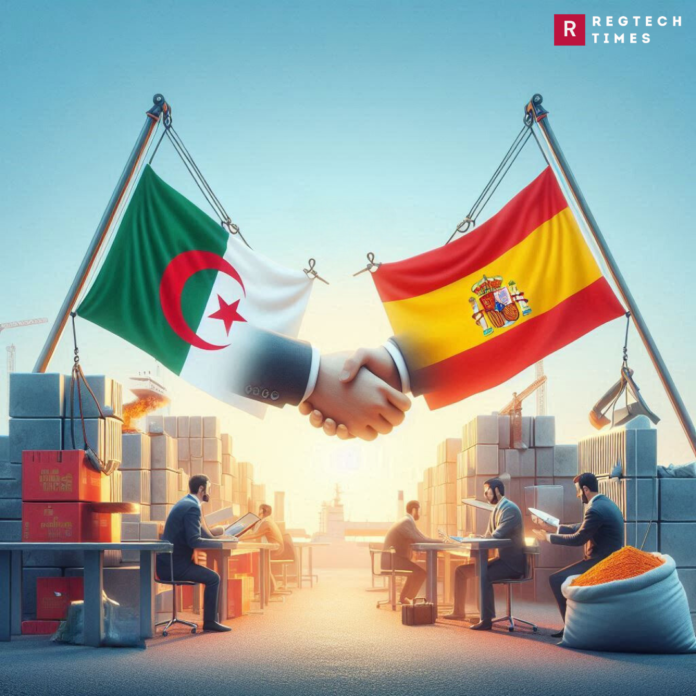Algeria has recently decided to lift its trade restrictions with Spain after nearly 900 days of economic retaliation. The cause of this blockade began in 2022 when the Spanish government decided to support Morocco’s position on Western Sahara.
Spain recognized Morocco’s plan for Western Sahara as the “most serious, credible, and realistic” option to end the long-standing dispute. This decision angered Algeria, which has long supported the Polisario Front, a group that seeks independence for the Sahrawi people in the region.
In response to Spain’s support for Morocco, Algeria took a drastic step by freezing trade with Spain, blocking most products from entering and leaving the country. This measure was intended as punishment for Spain’s decision. However, after a significant period, the Algerian government has now decided to end these trade restrictions. The Bank of Algeria sent out a communication to banks across the country, stating that trade with Spain would be fully unblocked, allowing transactions to resume as normal.
The End of Restrictions and Their Impact
The trade restrictions imposed on Spain were a serious economic measure that affected both countries. During the blockade, Algeria’s imports from Spain were nearly frozen, with a few exceptions for products like meat, poultry, and cement, which are crucial for Algeria’s food supply and construction needs. Despite the freeze on most other goods, Algeria did continue to trade some products, such as iron, with Spain. The lifting of these restrictions now means that all sectors, from food and construction to technology and other industries, can resume trade freely.
Suspicious Timing: Algeria’s Espionage Arrests Before the Presidential Election
The decision to end the trade restrictions comes as Algeria seeks to improve its economic situation. The trade freeze with Spain had caused significant economic losses for both countries. The closure of trade meant that millions of dollars in potential business were lost. Spain and Algeria have long had strong trade relations, and these were severely disrupted during the trade freeze. The lifting of the trade restrictions is seen as a step towards rebuilding these economic ties, which had been strained by political disagreements over Western Sahara.
Algeria’s decision was officially announced by the Bank of Algeria, which directed banks to resume processing foreign trade transactions with Spain. The move will help revive the flow of goods and services between the two countries, easing the burden on businesses that had been affected by the trade freeze. This action is expected to have a positive impact on the Algerian economy, which has been facing difficulties due to the ongoing trade restrictions.
The Shift in Relations with France
At the same time, Algeria is now facing a new challenge in its trade relations with another important country, France. Recently, France reaffirmed its support for Morocco’s stance on Western Sahara. This move by French President Emmanuel Macron to back Morocco’s proposal has upset Algeria, which is strongly opposed to Morocco’s claim over Western Sahara. In response, Algeria has decided to impose its own trade closure with France, similar to the measures taken against Spain earlier.
Algeria Accuses Singer Cheb Khaled of Spying for Morocco
This new trade freeze with France is likely to cause significant economic losses for Algeria. France has been a key economic partner for Algeria for many years, and the trade relationship between the two countries is substantial. Closing the trade lines with France means that Algeria will lose access to an important market for its goods and services, and French companies will also be affected by the sudden halt in trade. This could result in billions of euros in losses, as trade between the two countries has been vital for both sides.
The decision to cut off trade with France comes after the French government reiterated its support for Morocco’s claims over Western Sahara. Algeria’s government views this as a major diplomatic issue, as it has been a longtime supporter of the Polisario Front, which demands a referendum on independence for the Sahrawi people. Algeria wants a solution to the Western Sahara conflict that does not involve the inclusion of the territory within Morocco’s borders. As a result, the trade relations with France have now been frozen as a way to express Algeria’s dissatisfaction with France’s position on the issue.
Economic and Political Fallout
The lifting of the trade restrictions with Spain marks a significant turning point in Algeria’s economic relations with the country. After nearly three years of strained relations, Algeria has decided to unblock trade, allowing both nations to resume business as usual. This decision will have a positive impact on the Algerian economy, which had suffered from the trade freeze. However, at the same time, Algeria is now facing the challenge of a new trade freeze with France, which is likely to have its own set of economic consequences.
The impact of these trade restrictions is far-reaching. The countries involved—Algeria, Spain, and France—are all experiencing economic losses due to the disruptions in trade. The closure of trade relations between nations can result in billions of dollars in losses, which affects companies, workers, and the broader economy. Algeria’s decision to lift the trade restrictions with Spain is a step towards rebuilding its economic ties with one important partner, but the country must now navigate the challenges of its strained relationship with France. These diplomatic and economic struggles highlight the complex interplay between politics and trade in the global economy.


